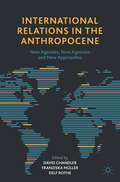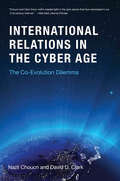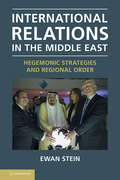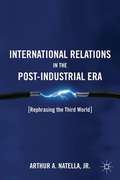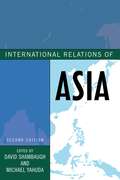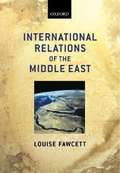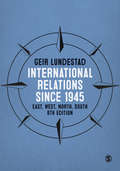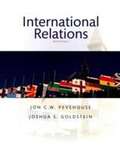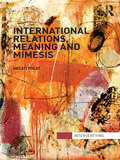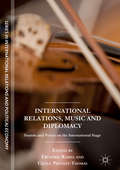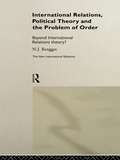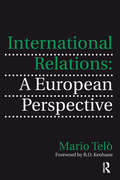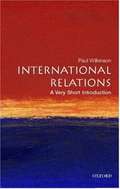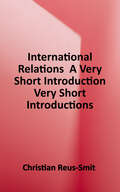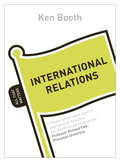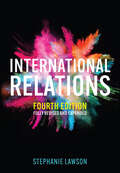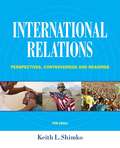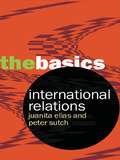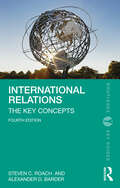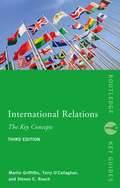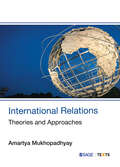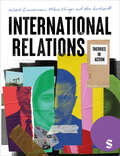- Table View
- List View
International Relations in the Anthropocene: New Agendas, New Agencies and New Approaches
by David Chandler Delf Rothe Franziska MüllerThis textbook introduces advanced students of International Relations (and beyond) to the ways in which the advent of, and reflections on, the Anthropocene impact on the study of global politics and the disciplinary foundations of IR. The book contains 24 chapters, authored by senior academics as well as early career scholars, and is divided into four parts, detailing, respectively, why the Anthropocene is of importance to IR, challenges to traditional approaches to security, the question of governance and agency in the Anthropocene, and new methods and approaches, going beyond the human/nature divide.
International Relations in the Cyber Age: The Co-Evolution Dilemma (The\mit Press Ser.)
by David D. Clark Nazli ChoucriA foundational analysis of the co-evolution of the internet and international relations, examining resultant challenges for individuals, organizations, firms, and states.In our increasingly digital world, data flows define the international landscape as much as the flow of materials and people. How is cyberspace shaping international relations, and how are international relations shaping cyberspace? In this book, Nazli Choucri and David D. Clark offer a foundational analysis of the co-evolution of cyberspace (with the internet as its core) and international relations, examining resultant challenges for individuals, organizations, and states.The authors examine the pervasiveness of power and politics in the digital realm, finding that the internet is evolving much faster than the tools for regulating it. This creates a “co-evolution dilemma”—a new reality in which digital interactions have enabled weaker actors to influence or threaten stronger actors, including the traditional state powers. Choucri and Clark develop a new method for addressing control in the internet age, “control point analysis,” and apply it to a variety of situations, including major actors in the international and digital realms: the United States, China, and Google. In doing so they lay the groundwork for a new international relations theory that reflects the reality in which we live—one in which the international and digital realms are inextricably linked and evolving together.
International Relations in the Middle East: Hegemonic Strategies and Regional Order
by Ewan SteinDeveloping an original theoretical approach to understanding the roots of regional conflict and cooperation, International Relations in the Middle East explores domestic and international foreign policy dynamics for an accessible insight into how and why Middle Eastern regional order has changed over time. Highlighting interactions between foreign policy trajectories in a range of states including Egypt, Iran, Iraq, Israel, Saudi Arabia, Syria and Turkey, Ewan Stein identifies two main drivers of foreign policy and alignments: competitive support-seeking and ideological externalisation. Clearly linking political, ideological and foreign policy dynamics, Stein demonstrates how the sources of regional antagonisms and solidarities are to be found not in the geopolitical chessboard, but in the hegemonic strategies of the region's pivotal powers. Making the case for historical sociology - in particular the work of Antonio Gramsci and Louis Althusser - as the most powerful lens through which to understand regional politics in the Middle East, with wider implications for the study of regional order elsewhere.
International Relations in the Post-Industrial Era
by Jr. Arthur A. NatellaThe current emphasis on the greening of the world marks a beginning of a new concern for our relationship with our planet. This book states that we are entering into a new era - a transitional time in history in which the values of the industrial revolution are being replaced by a post-industrial consciousness.
International Relations of Asia (Asia in World Politics)
by David Shambaugh Michael Yahuda Shambaugh YahudaAs the world's most dynamic region, Asia embodies explosive economic growth, diverse political systems, vibrant societies, modernizing militaries, cutting-edge technologies, rich cultural traditions amid globalization, and strategic competition among major powers. As a result, international relations in Asia are evolving rapidly. In this fully updated and expanded volume, leading scholars from Asia, Europe, and North America offer the most current and definitive analysis available of Asia's regional relationships. They set developments in Asia in theoretical context, assess the role of leading external and regional powers, and consider the importance of subregional actors and linkages. Combining interpretive richness and factual depth, their essays provide an authoritative and stimulating overview. Students of contemporary Asian affairs--new to the field and old hands alike--will find this book an invaluable read. Contributions by: Amitav Acharya, Sebastian Bersick, Nayan Chanda, Ralph A. Cossa, Michael Green, Samuel S. Kim, Edward J. Lincoln, Martha Brill Olcott, T.V. Paul, Phillip C. Saunders, David Shambaugh, Sheldon W. Simon, Scott Snyder, Robert Sutter, Hugh White, and Michael Yahuda
International Relations of the Middle East
by Louise FawcettThis book aims to provide the reader with a comprehensive, yet accessible guide for understanding the International Relations of the Middle East in the last century. Few parts of the world have been quite so buffeted by conflict and war; few parts of the world so much written about and debated in recent times, while at the same time remaining so subject to misunderstanding and stereotype. As one scholar wrote, reflecting on the legacy of fifty years of academic study of the region: 'Middle Eastern political processes defy observation, discourage generalization and resist explanation' (Bill 1996: 503). This volume is designed to improve our understanding of the Middle East by contemplating its International Relations in broad terms. These two subject areas, International Relations and Middle East politics, are highly interdependent, as even a cursory survey of major works shows. No book on the Middle East can afford to ignore the way that external forces have shaped the development of the region's politics, economics and societies, or indeed how the region itself has contributed to frame and shape the global environment. Similarly, no International Relations text can afford to ignore the rich case studies that the Middle East has supplied, and how they illuminate different theories and concepts of the discipline. It is a surprising feature of the literature, that despite advances in recent years, relatively little work has been done to bring these subject areas closer together. While other regions of the world appear to have been more susceptible to such exercises, Middle East Studies and International Relations continue to stand apart in an uneasy and often unfamiliar relationship (Tessler et al. 1999). Also taken from book.
International Relations since 1945: East, West, North, South
by Geir LundestadIntroducing the key events and developments in international relations, this authoritative and engaging book provides students with a clear understanding of the contemporary issues in international politics. Putting the foundations and contexts of International Relations at your fingertips, this Eighth Edition: Provides an account of the world as it has evolved up to 1945 Extended coverage of topics including population, gender and the environment Includes expanded material on the theory of international relations Includes new learning resources, including an ‘alternative perspectives’ box in each chapter Supports research with fully updated and annotated further reading lists Praised for its detail and tone, International Relations since 1945 is ideal for providing undergraduates with a historical background as they approach international relations.
International Relations, Eleventh Edition
by Joshua S. Goldstein Jon C. W. PevehouseInternational Relations enables readers to form a framework for analyzing the complex and constantly changing information that comprises our increasingly interconnected world. Opening readers’ eyes to the positive and negative events that occur across the globe every day, authors Jon Pevehouse and Joshua Goldstein offer a strong foundation in current global affairs, with insight into topics like foreign assistance in the developing world, the changing nature of war, and global poverty levels. <P><P>The Eleventh Edition explores themes of international relationships from economic, social, and political standpoints. Through human scale stories that touch on broader themes such as war and peace, humans and their environment, poverty and development, and more, the book provides readers with relatable material to understand international relations.
International Relations, Meaning and Mimesis: Foundations For Indigenous Peoples In The Global Mining Boom (Interventions)
by Necati PolatInternational Relations, Meaning and Mimesis is an innovative assessment of the uses of theory in making sense of international politics, opening up new pathways to thinking about the basics of the study area. Insights drawn from an interdisciplinary corpus of critical scholarship are synthesized and brought to bear on key concepts such as sovereignty, the state, peace, law, justice, ethics, and supranationality. The mainstream characteristically dismisses the narrativity that accompanies these concepts as derivative, tending to treat meaning attributable to them as static. The work shows how problematic this disdain of mimesis (exchange, reproduction, imitation) is and how this mindset effectively incapacitates conventional theorizing in both predicting phenomena and providing a normative vision. Integrating the study of international politics into debates in the wider academia over meaning and mimesis, this ambitious work is fluent and accessible at the same time, with exceptional lucidity in presenting difficult philosophical notions. A series of radical positions advanced in the book on theory and methodology not only address and call to account the mainstream imagination on international politics but also outline the implications of this critique for a host of specific issue areas, including peace research, normative theories, international law, and European studies.
International Relations, Music and Diplomacy
by Frédéric Ramel Cécile Prévost-ThomasThis volume explores the interrelation of international relations, music, and diplomacy from a multidisciplinary perspective. Throughout history, diplomats have gathered for musical events, and musicians have served as national representatives. Whatever political unit is under consideration (city-states, empires, nation-states), music has proven to be a component of diplomacy, its ceremonies, and its strategies. Following the recent acoustic turn in IR theory, the authors explore the notion of “musical diplomacies” and ask whether and how it differs from other types of cultural diplomacy. Accordingly, sounds and voices are dealt with in acoustic terms but are not restricted to music per se, also taking into consideration the voices (speech) of musicians in the international arena.Read an interview with the editors here: https://www.sciencespo.fr/ceri/en/content/international-relations-music-and-diplomacy-sounds-and-voices-international-stage
International Relations, Political Theory and the Problem of Order: Beyond International Relations Theory? (New International Relations)
by N. J. RenggerAt the turn of the millennium, and now after the fall of the Berlin wall, the best way to map the trajectories of contemporary international relations is hotly contested. Is the world more or less ordered than during the cold war? Are we on the way to a neo-liberal era of free markets and global governance, or in danger of collapsing into a new Middle Ages? Are we on the verge of a new world order or are we slipping back into an old one?These issues are amongst those that have dominated International Relations Theory in the late 1980s and 1990s, but they have their roots in older questions both about the appropriate ways to study international relations and about the general frameworks and normative assumptions generated by various different methodological approaches. This book seeks to offer a general interpretation and critique of both methodolgical and substantive aspects of International theory, and in particular to argue that International Relations theory has seperated itself from the concerns of political theory more generally at considerable cost to each.Focussing intially on the 'problem of order' in international politics, the book suggests that International Relations theory in the twentieth century had adopted two broad families of approaches, the first of which seeks to find ways of 'managing' order in international relations and the second of which seeks to 'end' the problem of order. It traces three specific sets of responses to the problem of order within the first approach, which emphasize 'balance', 'society' and 'institutions' and outlines two responses within the second grouping, an emphasis on emancipation and an emphasis on limits. Finally, the book assesses the state of International Relations theory today and suggests an alternative way of reading the problem of order which generates a different trajectory for theory in the twenty first century.
International Relations: A Beginner's Guide (Beginner's Guides)
by Charles JonesToday, more than ever, we are buffeted by forces that originate from beyond our shores. Whether it's war, economics, politics, or law, we live in a global world influenced by a complex landscape of international transactions. Esteemed academic Charles Jones ably provides the building blocks to understand the history of these interactions, outlining all the key actors - from the United States and China to the IMF and Google - and the competing theories that attempt to explain them. Arguing that the strength of international relations lies in its contradictions - it's not a single discipline but a fascinating mess of history, politics, economics, sociology, law, anthropology, and cultural studies - this guide provides a lively discussion of the limitations of the field, as well as an explanation of why it is so essential. Covering globalization, conflict, history, and theory, this is the perfect primer for students of international relations, workers in an international context, and citizens across the globe.
International Relations: A European Perspective
by Mario TelòInternational Relations: A European Perspective presents the main schools of international relations while underlining the added value of the European approach. Contrary to US or East Asian perspectives, a European viewpoint adopts a critical approach to traditional cleavages. The author demonstrates the added value of a European approach to international relations, taking into account both the shortcomings and achievements found within European history and current European unity. Key themes include: the evolution of state sovereignty, regional cooperation between previous enemies, political impact of economic integration, regimes building, international rule setting, institutionalization of international relations, and the weight of ideas and perceptions by transnational cooperation. This comprehensive assessment takes into consideration every school of international relations critically presented from this original perspective and as such makes the book ideal for courses on international relations.
International Relations: A Very Short Introduction
by Paul WilkinsonOf undoubtable relevance today, in a post-9-11 world of growing political tension and unease, this Very Short Introduction covers the topics essential to an understanding of modern international relations. Paul Wilkinson explains the theories and the practice that underlie the subject, and investigates issues ranging from foreign policy, arms control, and terrorism, to the environment and world poverty. He examines the role of organizations such as the United Nations and the European Union, as well as the influence of ethnic and religious movements and terrorist groups which also play a role in shaping the way states and governments interact. This up-to-date book is required reading for those seeking a new perspective to help untangle and decipher international events.
International Relations: A Very Short Introduction (Very Short Introductions Ser.)
by Christian Reus-SmitInternational relations affects everyone's lives: their security, economic well-being, rights and freedoms, and the environment they share. Recently we have seen the transformation from a world of empires to today's world of sovereign states, which are enmeshed in a complex array of international institutions, all exercising degrees of political authority. The new global organization of political authority has far-reaching consequences. This Very Short Introduction untangles this complex world, providing an accessible framework for understanding the contours of global political change. The author treats theory as an indispensable tool for grasping international relations, but demystifies theorizing, introducing it as an everyday human practice. He surveys a range of theories, from realism to feminism: reading them as contrasting perspectives on the global organization of political authority. Historically, such organization has been shaped by diverse social forces, four of which are discussed in detail: shifting patterns of warfare, changing economic conditions, struggles for rights, and the politics of culture. The author concludes with a reflection on the future of international relations in an era of profound global change.
International Relations: All That Matters (All That Matters)
by Ken BoothEverybody these days needs to know about international relations, because their workings shape all our lives. This book, explaining the particular significance of the international level of world politics, offers a comprehensive, accessible, and challenging overview of what is at stake, and what you need to know.World politics can be understood, simply, as Who Gets What, Where and How? (globally) to borrow a title from a famous old book by Harold Lasswell. International relations are a critical level in that business of determining who gets what across the world. Decisive things take place at the international level, and they directly or indirectly affect all our lives: war, trade, and the provision (or not) of human rights for example. This is why the practice of international relations matter. The reason academic International Relations matter is because it is the subject that asks the most fundamental questions about the politics of who gets what and how, and in the biggest political arena of all.
International Relations: All That Matters (Atm Ser.)
by Ken BoothEverybody these days needs to know about international relations, because their workings shape all our lives. This book, explaining the particular significance of the international level of world politics, offers a comprehensive, accessible, and challenging overview of what is at stake, and what you need to know. World politics can be understood, simply, as Who Gets What, Where and How? (globally) to borrow a title from a famous old book by Harold Lasswell. International relations are a critical level in that business of determining who gets what across the world. Decisive things take place at the international level, and they directly or indirectly affect all our lives: war, trade, and the provision (or not) of human rights for example. This is why the practice of international relations matter. The reason academic International Relations matter is because it is the subject that asks the most fundamental questions about the politics of who gets what and how, and in the biggest political arena of all.
International Relations: Contending Approaches To World Politics
by Stephanie LawsonInternational relations emerged as a distinct academic discipline in the early twentieth century, but its philosophic foundations draw on centuries of thinking about human nature, power and authority, justice and injustice, the idea of sovereignty and the implications for relations within and between political communities. The historic sources of these ideas appear to draw largely on European or Western experiences but, as this book shows, influences have emanated from much further afield, while contemporary thought is becoming more open to insights from non-Western sources. In this fully updated and expanded fourth edition of her popular text, Stephanie Lawson retains a broad world historical and contextual approach to the central themes and theoretical perspectives in IR, while also addressing the most pressing issues facing the world today. Topics covered include the emergence of states and empires, theories ranging from classical realism and liberalism to postcolonial and green theory, twentieth-century international history, security and insecurity, global governance and world order, international political economy and the prospects for a ‘post-international’ world in an era that has seen both deepening globalization and accompanying challenges to the sovereign state, as well as the reassertion of nationalist ideas around the world. With a range of additional pedagogical features to assist learning and class discussion, this lively and accessible text is an ideal primer for beginner and intermediate students alike.
International Relations: Perspectives, Controversies and Readings (Fifth Edition)
by Keith L. ShimkoEngaging and highly accessible, this reader-friendly text features broad coverage of key principles of international relations, providing a thorough introduction to the discipline while avoiding excessive detail and complexity. International Relations: Perspectives, Controversies, and Readings, Fifth Edition, explores essential concepts such as power politics, war and democracy, human nature, free trade, inequality, globalization, humanitarian intervention, and terrorism. Each chapter features brief, topical coverage presented within a debate framework, challenging you to think critically, consider diverse perspectives, and apply what you have learned to real-world scenarios. The author also includes current, relevant primary source readings, giving you firsthand exposure to the materials and ideas shaping international relations today. Thoroughly revised, the Fifth Edition of this popular text features updated content in nearly every chapter, including the most recent statistics, research, trends, theories, and examples drawn from today's headlines, including chemical weapons in Syria, the conflict between Russia and Ukraine, and the debate over climate change and global resources.
International Relations: The Basics (The Basics)
by Juanita Elias Peter SutchInternational Relations is a concise and accessible introduction for students new to international relations and for the general reader. It offers the most up-to-date guide to the major issues and areas of debate and: explains key issues including humanitarian intervention and economic justice features illustrative and familiar case studies from around the world examines topical debates on globalization and terrorism provides an overview of the discipline to situate the new reader at the heart of the study of global politics Covering all the basics and more, this is the ideal book for anyone who wants to understand contemporary international relations.
International Relations: The Key Concepts (Routledge Key Guides)
by Steven C. Roach Alexander D. BarderFeaturing 16 new entries, International Relations: The Key Concepts, now in its fourth edition, is the essential guide for anyone interested in international affairs. Comprehensive and up to date, it introduces the most important themes in international relations. New entries include the following: Anthropocene Authoritarian populism Borders Brexit Dignity Hierarchy Intersectionality Pandemic Postmodern warfare Race war Resilience Featuring suggestions for further reading as well as a unique guide to websites on international relations, this accessible guide is an invaluable aid to an understanding of this expanding field, ideal for student and non-specialist alike. It will serve as a vital reference text for undergraduate IR courses.
International Relations: The Key Concepts (Routledge Key Guides)
by Martin Griffiths Steven C. Roach Terry O'Callaghan‘To attempt such a difficult task requires ambition, confidence and skill. All three qualities are evident in this impressive reference book. It deserves a prominent place in all International Relations libraries’. Dr Scott Burchill, In Australian Journal of Political Science, 43:4, 747 — 766. Now in its third edition, International Relations: The Key Concepts, remains an important resource for anyone interested in international politics. Comprehensive and relevant, it has been fully revised to reflect the most important themes and issues in international relations in the post-9/11 era. Featuring new entries on: • The Arab Spring • Responsibility to Protect • Governmentality • Postcolonialism • Neoliberalism • Global Financial Crisis With suggestions for further reading and a useful guide to websites, International Relations: The Key Concepts is an ideal aid for students and newcomers to the field of International Relations.
International Relations: Theories and Approaches
by Amartya MukhopadhyayA complete compendium on theories and approaches to international relations covering debates surrounding the major paradigms and latest developments. Organized around the three paradigms of the discipline of international relations (IR) - realism, pluralism and globalism - this textbook offers a comprehensive and exhaustive coverage of the theories and approaches to IR, including their critiques and evaluations. By treating these theories and approaches under the canopy of the paradigms rather than in isolation, the book facilitates better understanding of their fundamental commonalities and divergences. It addresses the ongoing lively debates both inside and among the paradigms as well as the excessive American-centricity and Eurocentrism of the discipline of IR. Written as an integrated, self-sufficient unit, this textbook will be a valuable companion for inquisitive undergraduate and postgraduate students, research scholars and teachers, who need not search for additional books and references. Key Features: • Careful organization of 15 theories into 3 positivist paradigmatic divisions, and treatment of 4 post-positivist theories to offer a comprehensive and logical approach to the entire subject • Focus on non-Western traditions of IR thinking such as Kautilya from India, Han Fei from China and reference to India in the study of old regionalism • Systematic browsing of relevant theoretical literature and current citations for every theoretical point made • Additional features such as Word Help boxes and review questions to enhance teaching - learning experience • Six chapters available on the companion website to address the needs of advanced readers
International Relations: Theories in Action
by Hubert Zimmermann Milena Elsinger Alex BurkhardtThe definitive applied theory textbook that helps you make sense of global issues through theoretical concepts. Not presupposing any prior knowledge, this introduction equips you with the skills to use theories as adaptable tools to tackle complex global issues. Adopting a critical and questioning approach, you will be equipped in theory as a series of tools to be used, adapted, combined, and applied when grappling with some of the most contested issues in global politics. Theoretical perspectives are brought alive as a vital tool to understand concrete historical and contemporary examples. This indispensable text starts by examining key theories spanning constructivism and postcolonialism to realism and liberalism with a real-world perspective which prioritises empirical purchase. From here, chapters take a critical, questioning approach to tackle core problems of international politics – from armed conflict and financial markets to the climate crisis, global inequality, gender and race. This text is the ideal companion for all undergraduate and postgraduate students of global affairs. Hubert Zimmermann is Professor of International Relations at Philipps University of Marburg, Germany. Milena Elsinger is Head of the student information department at Philipps University of Marburg, Germany. Alex Burkhardt teaches at the Bundessprachenamt in Koblenz, Germany and previously taught at Philipps University Marburg, Germany.
International Relations: Theories in Action
by Hubert Zimmermann Milena Elsinger Alex BurkhardtThe definitive applied theory textbook that helps you make sense of global issues through theoretical concepts. Not presupposing any prior knowledge, this introduction equips you with the skills to use theories as adaptable tools to tackle complex global issues. Adopting a critical and questioning approach, you will be equipped in theory as a series of tools to be used, adapted, combined, and applied when grappling with some of the most contested issues in global politics. Theoretical perspectives are brought alive as a vital tool to understand concrete historical and contemporary examples. This indispensable text starts by examining key theories spanning constructivism and postcolonialism to realism and liberalism with a real-world perspective which prioritises empirical purchase. From here, chapters take a critical, questioning approach to tackle core problems of international politics – from armed conflict and financial markets to the climate crisis, global inequality, gender and race. This text is the ideal companion for all undergraduate and postgraduate students of global affairs. Hubert Zimmermann is Professor of International Relations at Philipps University of Marburg, Germany. Milena Elsinger is Head of the student information department at Philipps University of Marburg, Germany. Alex Burkhardt teaches at the Bundessprachenamt in Koblenz, Germany and previously taught at Philipps University Marburg, Germany.
